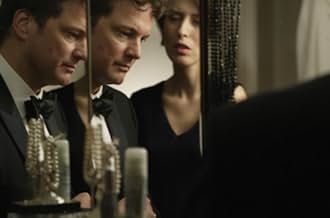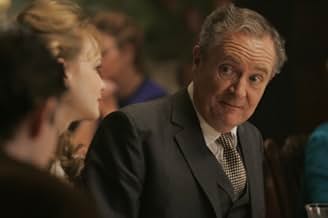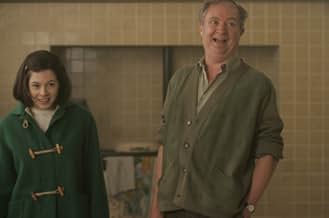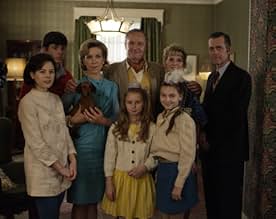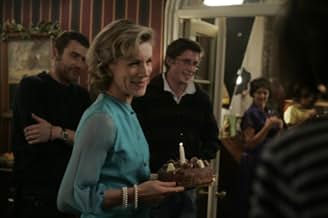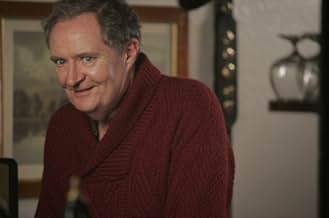IMDb रेटिंग
6.8/10
4.8 हज़ार
आपकी रेटिंग
अपनी भाषा में प्लॉट जोड़ेंThe story of a son's conflicting memories of his dying father.The story of a son's conflicting memories of his dying father.The story of a son's conflicting memories of his dying father.
- पुरस्कार
- 1 जीत और कुल 12 नामांकन
फ़ीचर्ड समीक्षाएं
Blake Morrison's memories are served for public consumption in a respectful but slightly confused rendition. Jim Broadbent delight us, once more, with his overgrown child of a father that seems a figment of her son's imagination. His childishness seems to be his only flaw. I couldn't help but being reminded of Tim Burton's "Big Fish" this time, with radically different flights of fancy. Colin Firth plays the writer/son as a crashing bore. Was that on purpose? I've been longing to see Firth again in parts like the ones he so amazingly captured - "Apartment Zero" comes to mind. Here earnest or not earnest, loving, selfish and so forth I didn't quite get myself interested enough to care as much as I feel I should have. Matthew Beard, the younger Blake and Juliet Stevens as the mother, manage to create more intriguing characters. The film, however, belongs to Jim Broadbent - His character is a loving mix of assorted British loving eccentrics. The fact that this is the way her son Blakes remembers him, makes the experience worth while.
"And When Did You Last See Your Father?" (2007) is an English film directed by Anand Tucker. It reminded me of the U.S. film, "The Savages," because the central plot of both movies involves a dying father who has not lived an exemplary life. Jim Broadbent is superb as Arthur, an obviously wealthy man who nevertheless goes through life cheating and manipulating people in small ways. He has a bluff, hearty, hail-fellow-well-met personality that charms people who meet him for the first time. In reality, he bullies his son and cheats on his wife. (Juliet Stevenson is excellent in the supporting role of wife and mother, as is Matthew Beard who plays Blake as a teenager.)
Colin Firth is equally convincing as Arthur's son, Blake. He's a successful award-winning writer, who nonetheless sees himself as perpetually in his father's shadow. Both men must come to grips with the situation when Arthur develops terminal cancer.
Broadbent and Firth look like each other, so it's easy to accept them as father and son. The film unfolds in an intelligent and interesting fashion. It's both artistically satisfying and philosophically challenging. I think the movie has been underrated by IMDb viewers. It's low key and thoughtful, but that's what it's supposed to be. There's nothing about it that struck me as artificially artistic. It's an honest and effective film, and worth seeking out and seeing.
Colin Firth is equally convincing as Arthur's son, Blake. He's a successful award-winning writer, who nonetheless sees himself as perpetually in his father's shadow. Both men must come to grips with the situation when Arthur develops terminal cancer.
Broadbent and Firth look like each other, so it's easy to accept them as father and son. The film unfolds in an intelligent and interesting fashion. It's both artistically satisfying and philosophically challenging. I think the movie has been underrated by IMDb viewers. It's low key and thoughtful, but that's what it's supposed to be. There's nothing about it that struck me as artificially artistic. It's an honest and effective film, and worth seeking out and seeing.
No other actor could have played Jim Broadbent's part. He's fantastic as the stout father, who can never quite relay his intimate feelings and emotions to his son, who is played with understated brilliance by Colin Firth. Sarah Lancashire deserves a mention, who has a small part but delivers with consistent aplomb (she's great on the telly), and Matthew Beard as the young Blake Morrison, upon whom the film and book are auto-biographically based.
As his father lays on his deathbed, the son recounts his childhood memories of the part his dad played in his life, whether funny, mean, sad or eccentric. Smart direction plus great lead performances, at least one of which is definitely worthy of an Oscar, adds to the overall emotional connection with the audience and culminates with a surprisingly touching ending, despite it's inevitability.
Having seen the film with my mum, who not only read the book by Blake Morrison, but had a father much like the one portrayed in the film, I found it all the more connectible. But this is not to say it is not for everyone. I think we can all relate to the fathers who can never quite express how they truly feel, and the childhoods spent moping and dwelling on seemingly world-shattering things.
The cinema i saw this in had about ten people at most, which is shocking! We need to see more British films like this, if just to keep the British film industry going. It deserves to fill a theatre and gain much more exposure than it currently has, regardless of those who might say it would have been better placed on television.
It is a superb film, thoughtfully shot, very well written and a joy to be in the company of for all of it's ninety minutes. And yes, I cried at the end. Sniff. But maybe you will too.
As his father lays on his deathbed, the son recounts his childhood memories of the part his dad played in his life, whether funny, mean, sad or eccentric. Smart direction plus great lead performances, at least one of which is definitely worthy of an Oscar, adds to the overall emotional connection with the audience and culminates with a surprisingly touching ending, despite it's inevitability.
Having seen the film with my mum, who not only read the book by Blake Morrison, but had a father much like the one portrayed in the film, I found it all the more connectible. But this is not to say it is not for everyone. I think we can all relate to the fathers who can never quite express how they truly feel, and the childhoods spent moping and dwelling on seemingly world-shattering things.
The cinema i saw this in had about ten people at most, which is shocking! We need to see more British films like this, if just to keep the British film industry going. It deserves to fill a theatre and gain much more exposure than it currently has, regardless of those who might say it would have been better placed on television.
It is a superb film, thoughtfully shot, very well written and a joy to be in the company of for all of it's ninety minutes. And yes, I cried at the end. Sniff. But maybe you will too.
Reel Inspiration Review: When Did You Last See Your Father.
When Did You Last See Your Father ignores standard Hollywood wisdom: Keep the title short and catchy. Avoid flashbacks. The action should be external, not internal. Make films that appeal to teenage boys. And most of all, don't do stories about old, dying people.
In an article about what sells in Hollywood, an agent moans that she just can't read one more story about coping with aging, dying parents. The market was glutted with them. I couldn't help but think that this must be a very timely and heartfelt theme since it was popping up in so many scripts. Is it possible that there's an adult audience hungry for stories that help them deal with the hard issues in their lives?
When Did You Last See Your Father is based on Blake Morrison's heart wrenchingly honest autobiographical bestseller. It is the story of the forty year old writer's attempts to resolve his troubled relationship with his father as he deals with his immanent death. Collin Firth courageously portrays the estranged son's sometimes unlikable sentiments of resentment, frustration, confusion, and disappointment tinged with compassion for his fading father. Being home brings back memories of coming of age in his charismatic father's shadow and discovering some hard realities about the man. Thanks to Jim Broadbent's dynamic performance, we can see why the son was once proud of him - even though he never felt his father's approval. Blake goes on an internal journey where he finds that he has some of his father's weaknesses. He must decide what kind of man he is to become. At first, the film's lengthy title seems to accuse the grown son of neglecting his father. But by the end, we discover that the title actually asks, "When was the last time you really saw your father - without your own feelings of inadequacy and resentment getting in the picture? When was the last time you saw love?"
Movie Blessings! Jana Segal reelinspiration dot blogspot dot com
When Did You Last See Your Father ignores standard Hollywood wisdom: Keep the title short and catchy. Avoid flashbacks. The action should be external, not internal. Make films that appeal to teenage boys. And most of all, don't do stories about old, dying people.
In an article about what sells in Hollywood, an agent moans that she just can't read one more story about coping with aging, dying parents. The market was glutted with them. I couldn't help but think that this must be a very timely and heartfelt theme since it was popping up in so many scripts. Is it possible that there's an adult audience hungry for stories that help them deal with the hard issues in their lives?
When Did You Last See Your Father is based on Blake Morrison's heart wrenchingly honest autobiographical bestseller. It is the story of the forty year old writer's attempts to resolve his troubled relationship with his father as he deals with his immanent death. Collin Firth courageously portrays the estranged son's sometimes unlikable sentiments of resentment, frustration, confusion, and disappointment tinged with compassion for his fading father. Being home brings back memories of coming of age in his charismatic father's shadow and discovering some hard realities about the man. Thanks to Jim Broadbent's dynamic performance, we can see why the son was once proud of him - even though he never felt his father's approval. Blake goes on an internal journey where he finds that he has some of his father's weaknesses. He must decide what kind of man he is to become. At first, the film's lengthy title seems to accuse the grown son of neglecting his father. But by the end, we discover that the title actually asks, "When was the last time you really saw your father - without your own feelings of inadequacy and resentment getting in the picture? When was the last time you saw love?"
Movie Blessings! Jana Segal reelinspiration dot blogspot dot com
After seeing 'When Did You Last See Your Father?', I was reminded that I was relieved that when I lost my Father a scant four years ago, we parted on very good terms. This is a powder keg of a film that manages to spill many tears & hidden truths about a father & son. The story, taken from the true accounts by writer Blake Morrison,is about the love/hate, love/love, hate/hate relationship Morrison shared with his own father, played to perfection by Jim Broadbent (of many a Mike Leigh film). Besides the well written/adapted screenplay,top notch direction & superb acting by the entire cast, I really admired the photography, utilizing light & dark & positioning as a framing device. The films's editing is a sight to behold, too (the way the action cuts back & forth in time over a period of 30 plus years). Hopefully, when Oscar time rolls around next year, 'When Did You Last See Your Father' will be a prime contender for at least a couple of awards.
क्या आपको पता है
- ट्रिवियाMatthew Beard wore brown coloured contact lenses in order to look more like Colin Firth.
- साउंडट्रैकCold Cold Feeling
Written by JM Robinson
Published by EMI Music Publishing Ltd
Performed by T-Bone Walker
Licensed courtesy of EMI Records Ltd
टॉप पसंद
रेटिंग देने के लिए साइन-इन करें और वैयक्तिकृत सुझावों के लिए वॉचलिस्ट करें
विवरण
- रिलीज़ की तारीख़
- कंट्री ऑफ़ ओरिजिन
- आधिकारिक साइटें
- भाषा
- इस रूप में भी जाना जाता है
- When Did You Last See Your Father?
- फ़िल्माने की जगहें
- उत्पादन कंपनियां
- IMDbPro पर और कंपनी क्रेडिट देखें
बॉक्स ऑफ़िस
- बजट
- $80,00,000(अनुमानित)
- US और कनाडा में सकल
- $10,77,273
- US और कनाडा में पहले सप्ताह में कुल कमाई
- $39,210
- 8 जून 2008
- दुनिया भर में सकल
- $27,52,471
- चलने की अवधि
- 1 घं 32 मि(92 min)
- रंग
- ध्वनि मिश्रण
- पक्ष अनुपात
- 2.35 : 1
इस पेज में योगदान दें
किसी बदलाव का सुझाव दें या अनुपलब्ध कॉन्टेंट जोड़ें







